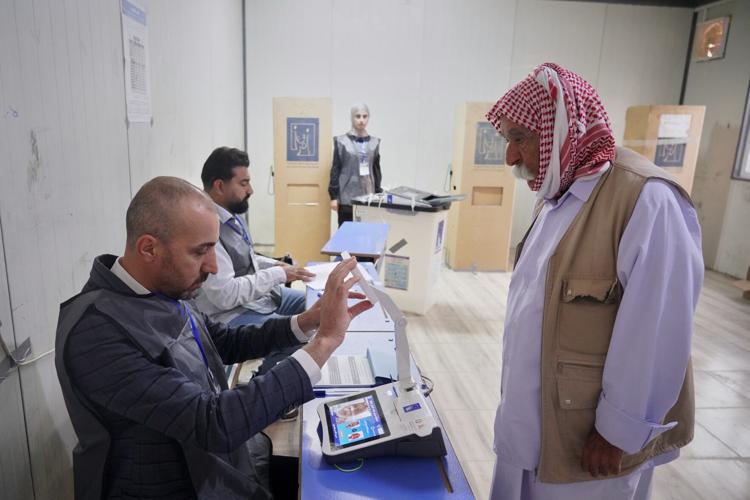World
Displaced Yazidis and Security Forces Vote Ahead of Iraqi Elections

Members of the Iraqi security forces and displaced individuals, including members of the Yazidi minority, participated in early voting on March 5, 2024, ahead of the parliamentary elections scheduled for March 7. This election will play a critical role in determining whether Iraqi Prime Minister Mohammed Shia al-Sudani secures a second term. The voting occurs amid rising tensions related to the geopolitical landscape involving Israel and Iran, as Iraq navigates its relationships with both Tehran and Washington.
An estimated 1.3 million members of the army and security personnel, alongside approximately 26,000 displaced individuals, are eligible to vote. With 7,744 candidates vying for seats, the majority represent parties aligned with specific sectarian interests.
Yazidis, many of whom fled their homes over a decade ago due to violent attacks by the Islamic State group, cast their ballots at a camp near Dohuk, located in the semi-autonomous Kurdish region of northern Iraq. Many of these displaced individuals have yet to return home, hindered by ongoing political disputes and a lack of essential infrastructure.
A polling station in a small school in Dohuk remained largely empty until around 09:00, when voters began to arrive. Some individuals carried worn identification cards, while others assisted elderly relatives into the facility. Inside, classrooms were filled with monitors from various political parties closely observing the proceedings.
The Yazidi community has faced significant hardships since the Islamic State’s campaign of terror, which devastated the Sinjar district in Nineveh province. Thousands were killed or enslaved as the militants targeted Yazidis as heretics. Although many have begun to return to Sinjar following the defeat of the Islamic State, the community grapples with a bleak future characterized by the destruction of homes and inadequate resources for rebuilding.
Khedhir Qassim, a displaced Yazidi from Sinjar, expressed frustration over the stagnant situation, stating, “Eleven years passed and the situation is the same. We want them to support us and rebuild our areas that are ruined due to their political dispute and where everyone works for their own benefit.”
Another displaced Yazidi, Edris Zozani, indicated his support for the Kurdish Democratic Party (KDP), one of Iraq’s two main Kurdish parties that holds considerable influence in Dohuk. He noted, “If we have independent Yazidi candidates, they wouldn’t be able to represent us effectively. But if they go to parliament as part of strong lists, like the KDP, they would be in a better position to support the Yazidi community.”
In the Iraqi capital, security personnel, including soldiers and police, also participated in the early voting, along with members of the Popular Mobilization Forces (PMF), a coalition primarily composed of Shiite militias that have been pivotal in the fight against the Islamic State. Although the PMF was formally integrated into Iraq’s military in 2016, it operates with significant autonomy, complicating the relationship with the central government.
The future of the PMF poses a complex issue for the forthcoming parliament, particularly amid ongoing tensions between Baghdad and Washington concerning the presence of Iranian-backed militias in Iraq. One militiaman, who opted to remain anonymous, shared, “I voted for the list that defends the PMF,” highlighting the political stakes involved.
As the elections approach, the focus remains on how the new parliament will address the myriad challenges facing Iraq, particularly for marginalized communities like the Yazidis, who continue to seek stability and support in the wake of years of conflict.
-

 Science3 weeks ago
Science3 weeks agoInterstellar Object 3I/ATLAS Emits Unique Metal Alloy, Says Scientist
-

 Science3 weeks ago
Science3 weeks agoResearchers Achieve Fastest Genome Sequencing in Under Four Hours
-

 Politics3 weeks ago
Politics3 weeks agoAfghan Refugee Detained by ICE After Asylum Hearing in New York
-

 Business3 weeks ago
Business3 weeks agoIconic Sand Dollar Social Club Listed for $3 Million in Folly Beach
-

 Health3 weeks ago
Health3 weeks agoPeptilogics Secures $78 Million to Combat Prosthetic Joint Infections
-

 Lifestyle3 weeks ago
Lifestyle3 weeks agoJump for Good: San Clemente Pier Fundraiser Allows Legal Leaps
-

 Science3 weeks ago
Science3 weeks agoMars Observed: Detailed Imaging Reveals Dust Avalanche Dynamics
-

 Business3 weeks ago
Business3 weeks agoMcEwen Inc. Secures Tartan Lake Gold Mine Through Acquisition
-

 World3 weeks ago
World3 weeks agoUS Passport Ranks Drop Out of Top 10 for First Time Ever
-

 Health3 weeks ago
Health3 weeks agoResearcher Uncovers Zika Virus Pathway to Placenta Using Nanotubes
-

 Entertainment3 weeks ago
Entertainment3 weeks agoJennifer Lopez Addresses A-Rod Split in Candid Interview
-

 Business3 weeks ago
Business3 weeks agoSan Jose High-Rise Faces Foreclosure Over $182.5 Million Loan









